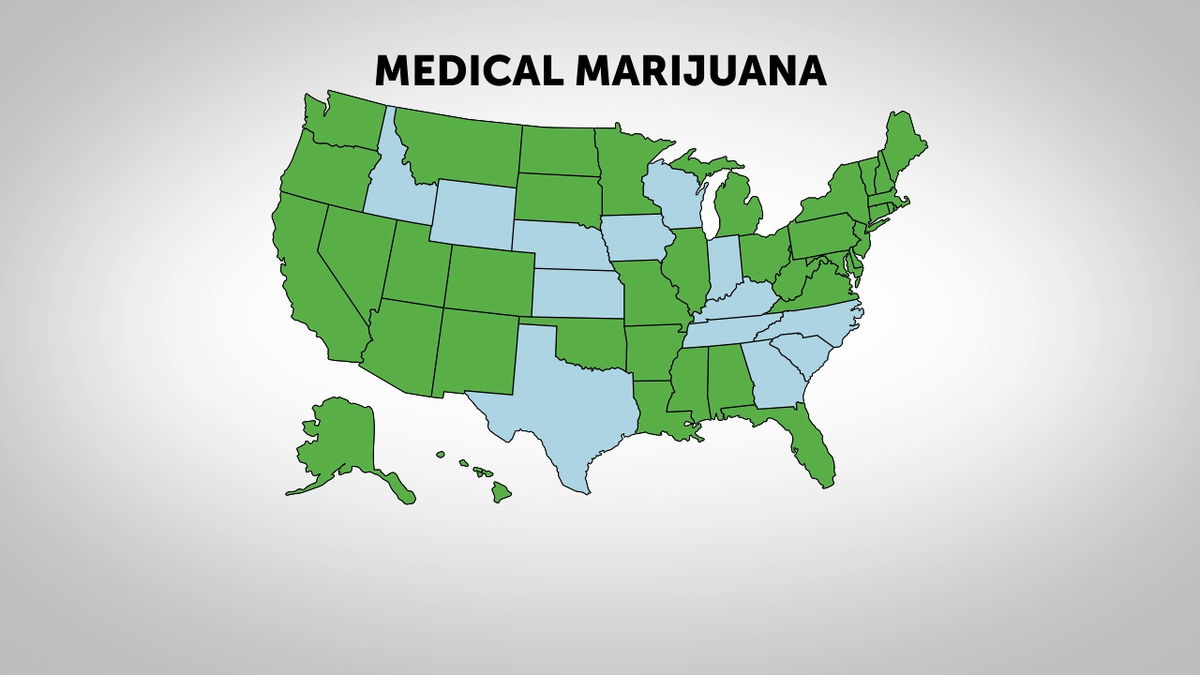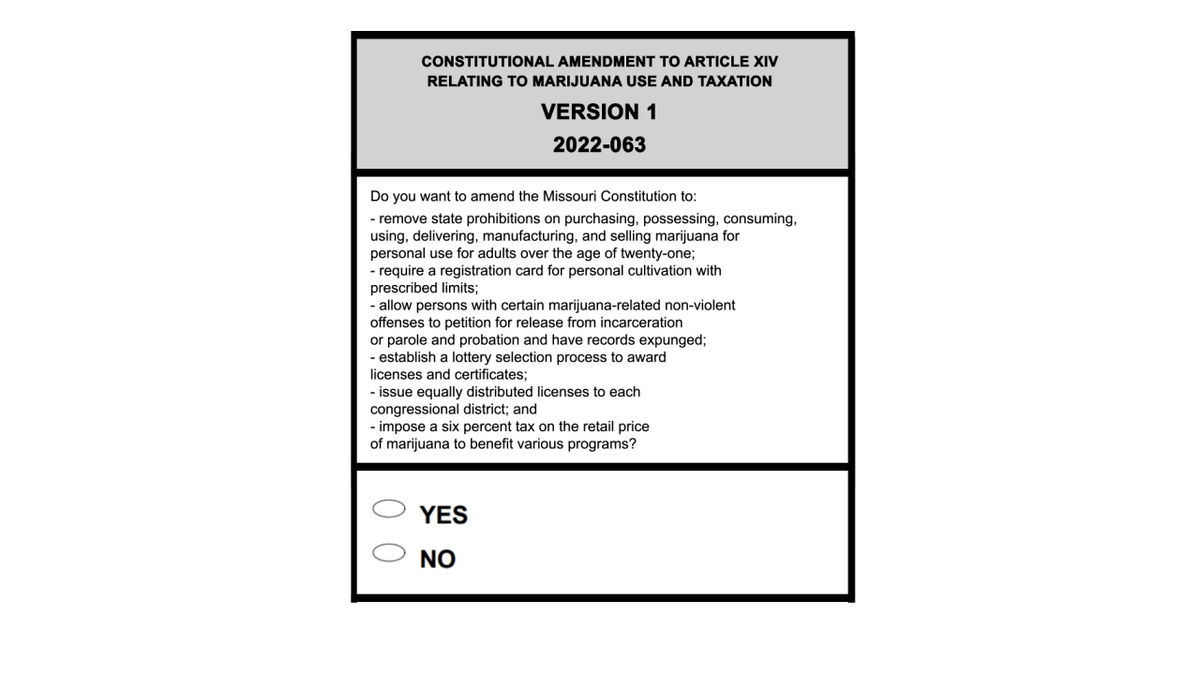As medical marijuana thrives, Missourians could see recreational use on November ballot
COLUMBIA, Mo. (KMIZ)
Editor's note: this article has been changed to reflect the most accurate number of medical marijuana patients.
Missouri is one of 37 states with legal access to medical marijuana.
In the four years since the program was approved by Missouri voters, it's grown to having dispensaries and cultivators in nearly every corner of the state.
Nearly 50 cultivation facilities are approved to operate in the state. There are over 190 licensed marijuana dispensaries across Missouri. Those support the over 187,000 Missourians who have medical marijuana licenses with qualifying conditions ranging from cancer to migraines to chronic pain to psychological dependence.

The legalization of medical marijuana
Medical marijuana was legalized in Missouri during the November 2018 election thanks to a citizen initiative petition, a Missouri process that allows everyday people to amend the state constitution with a ballot item if they garner enough of the public's support. With over 65% of the public voting in favor, Amendment 2 as Article XIV Section 1, "Right to access medical marijuana," was added to the Missouri Constitution.
Secretary of State Jay Ashcroft said there were two other marijuana-related initiatives on the ballot that year that were voted down.
"I think what it actually says matters, and I think the voters have shown that they will read it and if they like the idea, but not how it's implemented, they'll vote it down," Ashcroft said.
The Department of Health and Senior Services began accepting patient, caregiver and patient cultivator applications in June 2019.
The first sale of legal medical marijuana in Missouri was on Oct. 16, 2020 -- 23 months from when it was initially legalized. Since then, millions of dollars of medical marijuana have been legally sold in Missouri.
Jay Patel owns Green Releaf, a cannabis dispensary with six locations in Mid-Missouri and a seventh coming soon to Lee's Summit.
"It was a no-brainer that it was absolutely welcome and needed and asked for, and that's the reason this industry is where it is," Patel said.
Patel started looking into the cannabis industry after medical marijuana was legalized in Missouri in 2019. Patel saw the benefits of medical marijuana in two relatives, one with cancer and one with autism. Patel said he took a trip to Colorado to see how the industry functions and talk with business owners.
"Members that were working for these organizations were so passionate and so happy and satisfied to work for a cannabis industry, and we also saw that the patients that were being served were so ecstatic to be there," Patel said.
Patel was already in retail for over a decade before he started looking into cannabis. Patel said his relationship with leaders welcoming the business.
"Everywhere we went they were so welcoming," Patel said. "They were like, 'Yeah, the industry has a stigma, but because you've been in our towns doing business for 10-plus years, we know how you walk. You walk straight. You're being compliant in this regulated industry, so we have no concern.'"
Patel said he did about six months of prep work for his medical marijuana seller applications talking to city leaders, getting a team together that knows the industry and finding locations to open dispensaries.
"On one side, we were taught that it's a bad drug and it's a gateway drug and stay away from it, and I come from that background," Patel said. "Convincing myself, proving that theory wrong, I had to talk to a lot of people and kind of get to the bottom to see if this is just a hoke that everyone is playing, that they're saying it's a medicine just because they want to use cannabis, or is this really, truly a thing?"
The green: marijuana and money
Since Missouri collected its first sales taxes on medical marijuana in November 2020, the state has brought in $13,744,455 in taxes on $350 million of taxable sales. This number only includes state tax. Missouri taxes medical marijuana at a rate of 4%. The Missouri Department of Revenue estimates the total sales tax impact is $15 million.
Each month since January of this year, the state has brought in about $1 million in sales tax on over $20 million in taxable sales every month of this year.

State income from medical marijuana goes to the Missouri Veterans Coalition under Article XIV of the Missouri constitution.
On Sept. 11, 2020, the first deposit was made from the medical marijuana program. Over $2 million was transferred to the Missouri Veterans Coalition. At this point, no sales had occurred; the money was from application fees alone.
About a year later in September 2021, a second deposit was made to the Missouri Veterans Coalition of $6.8 million from medical marijuana taxes.
Marijuana's future in Missouri
With medical marijuana in Missouri turning into a multimillion-dollar industry, many are now looking toward legalizing recreational or adult use of marijuana in Missouri. However, advocates for recreational marijuana do not all agree on how to go about legalizing and decriminalizing it.

Clark Wu is an attorney in Arizona where marijuana is fully legalized and decriminalized. Wu said he sees a lot of similarities between the legalization processes in Missouri and Arizona.
"There's a lot of interest in Missouri right now in light of how well the medical program is doing, I think it's a promising field for business," Wu said. "With legalization sweeping across the U.S., expansion is on everybody's mind, and businesses are looking for new areas to invest in."
Two big pushes have been made for the legalization of recreational marijuana this year: the Cannabis Freedom Act and Legal Missouri 2022.
"It was really a two-track process that was being done by different people," Ashcroft said. "You had individuals that were working to get the legislature to pass something that would be put on the ballot, and at the same time you had individuals that had filed a potential constitutional amendment with our office and were collecting signatures."
The Cannabis Freedom Act was an omnibus bill sponsored by State Rep. Ron Hicks (R-O'Fallon). Due to disagreements among lawmakers, it did not pass this year.
Ben Hartley with Real Legalization Missouri is a big supporter of the Cannabis Freedom Act and recreational legalization through the legislative process. Hartley said passing recreational use through the legislative process instead of an initiative petition makes it more accessible to the average person and easier to amend.
"The difference is the representatives are accessible. They were willing to listen they were literally willing to hear us out and hear our perspective," Hartley said.
The group making traction is Legal Missouri 2022, a citizen initiative petition that gathered more than 390,000 signatures. If all the signatures are verified, it will be on the November ballot for the general public to decide whether it becomes an amendment to the constitution, the same way medical marijuana became law.

Election authorities are still verifying all the signatures, but Ashcroft expects to know whether it will be on the ballot by the end of July. The process has been delayed as election officials prepare for the August primaries with the newly redistricted maps.
"Plenty of time for both proponents and opponents, when we know whether or not it's going to be on the ballot, to make their case heard, and for the people to make the final decision in November," Ashcroft said.
Attorney Dan Viets worked on the medical marijuana initiative petition that became a constitutional amendment. He now works with Legal Missouri 2022.
"It’s very important to understand that legalization allows for people to know what they’re buying, to know that what they’re buying is not adulterated, that it’s not contaminated with mold or other unhealthy substances," Viets said. "It’s far more healthy for marijuana consumers in a legal, regulated and tested market."
Aside from legalizing marijuana for Missourians over 21, Legal Missouri 2022 also includes a provision that automatically expunges the criminal records of people charged with nonviolent marijuana offenses for 3 pounds or less. Anything over that would have to be approved by a judge.
"I think it’s never too soon to stop arresting more than 20,000 of our fellow Missourians for victimless behavior," Viets said. "Expungement will happen automatically for hundreds of thousands of Missourians."
Hartley said the expungement language in Legal Missouri 2022 is not enough for him to support the initiative.
"It says something along the lines of the judges can deny, early release or deny expungement for good cause," Hartley said. "It's one of those things that is open-ended and I don't think I'm not sure that they did that intentionally, but I think it was a poor choice of words."
Viets countered that point saying that any more lenient expungement policy would not appeal to the general public.
"Not everyone’s happy with that, but it’s a very small compromise," Viets said. "It’s important that this measure passes, frankly, and there are some compromises that are necessary in order to make it pass."
Although the medical marijuana program passed with widespread support, Ashcroft said the two other marijuana ballot items that did not pass in 2018 show that voters care about all the details.
"There's some continuity between the people who voted for the first one you would assume would vote for the second one," Ashcroft said. "There has been a lot of discussion about how well-implemented the marijuana program has been and how well written it is. And obviously, when that marijuana initiative petition was approved, there were two other ones on the ballot at the same time, and they turned down two of them and approved one of them."
The medical marijuana licensing process hasn't been without its issues. A family sued the state in 2020 over its cap on marijuana cultivation licenses. And state regulators have received subpoenas for records from a federal grand jury, the St. Louis Post-Dispatch reported. The newspaper also reported in June that a group of Perryville-based marijuana growers had to give up their licenses because of violations of state regulations.
Some lawmakers have also lobbed accusations of corruption in the licensing system.
